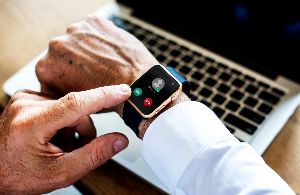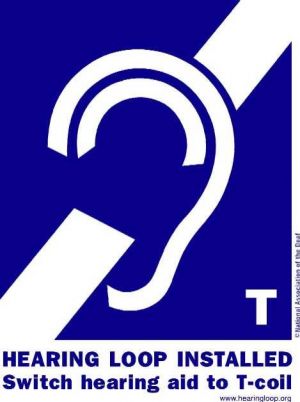|
www.HealthyHearing.com |
Assistive listening devices for hearing loss
By Emily Ostrowski, content manager, Healthy Hearing Last updated on: September 2nd, 2025 Assistive listening devices (ALDs) enable personal connections to audio sources for music and TV. Similarly, assistive listening systems (ALS) help in places like theaters and lecture halls. Key points:
If you have hearing loss, it is likely hearing aids will be a tremendous help to you in your daily life. But what about situations when your hearing aids aren’t quite enough? That's where hearing assistive technology like assistive listening devices (ALDs) and assistive listening systems (ALSs) come in. What are assistive listening devices?Assistive listening devices are tools that have been designed to amplify sound for people with hearing loss in specific settings, both for at home and in public places. Anyone who has toured a museum while wearing a special headset has used an assistive listening system, for example. Types of assistive listening devices
listening device. The sound can be routed to your hearing aids or a headset you wear. Assistive listening devices enable personal connections to devices, making it easier to hear or communicate. They include amplified telephones, hearing aid compatible phones and smartphones, television compatible devices, alerting devices, and remote microphones. Let's look closer at each category: Amplified and captioned telephonesAmplified phones are specifically designed for people with hearing loss, allowing you to turn up the volume as necessary to hear speech clearly. You do not need to wear hearing aids to benefit from these devices. They can make it easier to hear high-pitched sounds, which many people with hearing loss struggle to hear. These phones sometimes also feature amplified ring tones so you’ll never miss a call. Also, captioned phones provide real-time captioning, which can be particularly helpful for people with severe to profound hearing loss. Hearing aid compatible phones and telecoilsBy law, telephone manufacturers must make phones compatible with hearing aids. This includes smartphones like iPhones and Androids. 
assistive listening devices, by vibrating to alert you to notifications, like an incoming phone call. Hearing aid compatible phones generally use either acoustic or telecoil coupling. Acoustic coupling picks up and amplifies sounds from the phone as well as any noise around you. Telecoil coupling requires your hearing aid to be equipped with a telecoil, a special feature that only picks up the phone signal for amplification. Telecoils in hearing aids are desirable for many people because it blocks out background noise during phone calls. "Many hearing aids are equipped with a built-in telecoil but the audiologist may have not activated it," says Dr. Juliëtte Sterkens, an audiologist with HLAA. She recommends consumers ask their provider about telecoils. Another option is for consumers to search HLAA support chapters, where peers can give an in-person demonstration. "People can benefit from this telecoil feature, especially if they spend significant time on the phone or in a theater," Sterkens explains. Apps and watchesAdditionally, phone apps and smart watches can serve as their own unique ALDs. For example, caption apps can provide text translation for speech. More: How an Apple Watch can help with hearing aids and hearing loss Assistive listening devices for televisionsWhen you have trouble clearly understanding or hearing the television, watching your favorite shows can become a chore. Turning up the television isn’t always the best option since it can make sound distorted and even more difficult to understand. Not to mention, when you’re watching TV with others, maxing out the volume isn’t always a popular option. There are several television ALDs that can work for you whether or not you already wear hearing aids. Some television amplifiers work even without hearing aids. For example, TV Ears® is a popular and relatively inexpensive wireless headset with a personal volume control that plugs directly into your TV’s earphone socket. Alerting devicesMost ALDs help make listening easier, but some also help you stay connected to what is going on around you and improve your safety. These alerting devices rely on amplified sounds, visual cues and even vibrations to alert you to sounds in your environment. Some examples of alerting devices include vibrating alarm clocks to help you start your day on time, doorbell alerts that use flashing lights to let you know a visitor is at your door, as well as vibrating and flashing smoke and carbon monoxide detectors. Telephone IP relay serviceIP relay is a service that allows people with hearing and speech disabilities to make and receive phone calls using an operator (also known as a communication assistant) as a go-between. The user types messages on a smartphone, tablet, laptop, or desktop computer with an Internet connection, and the operator reads those messages aloud to the other person. Remote microphonesRemote microphones are small, wireless devices that help hearing aid users hear more clearly in challenging listening environments, like noisy restaurants. They can be particularly beneficial for people with more severe hearing loss and those that struggle to process sound when there is background noise. Remote microphones can be clipped to a speaker's clothing or placed on a table. Using Bluetooth, the speaker's voice is transmitted directly into a person's hearing aids improving speech clarity and making it much easier to hold a conversation. Do ALDs work the same as hearing aids?While assistive listening devices can make hearing easier, they are not the same as hearing aids. "Prescriptive hearing aids take into account your actual hearing test results and amplify only where you need help," said Dr. Paige Gainey, AuD at Total Hearing Care in Dallas, TX. "In contrast, assistive listening devices are supplementary tools that help improve listening in specific situations, like noisy environments, group discussions, or while watching TV." Dr. Gainey notes that these technologies are meant to complement hearing aids and enhance their functionality. "Think of ALDs as giving you a boost over what hearing aids can offer."
What are assistive listening systems?Assistive listening systems (ALSs) generally refers to system-wide technology that's useful in public settings such as a theater, airport, church or lecture hall. The Americans with Disabilities Act, or ADA, mandates that most public places offer some type of assistive listening system. There are three types of ALSs recognized by the ADA: 
access hearing loops.
All assistive listening systems are required to be accessible for people with hearing aids either with or without telecoil. "If your hearing aid has this telecoil built in, connecting to a hearing loop is very easy," Sterkens says. Of the three different public listening systems, hearing loops are preferred by most users, Sterkens says. "Many users like them so much they're working to get them installed all over the country." Do I need hearing assistive technology?While improvements in hearing aid technology such as Bluetooth connectivity and improved directional microphones have reduced the need for some of these assistive features, Dr. Gainey says that she speaks with patients every day about how these devices can help further improve their hearing. Assistive listening devices can benefit a wide range of people, she said, particularly those who frequently attend academic lectures, religious services, or group meetings. They are also helpful for those who struggle to hear in specific situations, such as talking on the phone, dining out, participating in work meetings, or watching TV. If there’s any setting where you need extra hearing support, these devices can significantly improve both your hearing and overall quality of life. "ALSs and ALDs help patients engage more fully in social, work, or leisure activities, reduce listening fatigue, and foster greater independence and inclusion." Where can I buy hearing assistive technologies and ALDs?Some clinics, such as Dr. Gainey's, offer assitive listening devices in the office, and if they don't have something can point their patients in the right direction. Additonally, most of these products are available online. "Unfortunately, there are very few storefronts providing hearing assistive technology. What we do have is mail-order and internet-based stores that sell much of this equipment online," Lise Hamlin, director of public policy for the Hearing Loss Association of America (HLAA) wrote in an article for The Hearing Journal. "To find them, you need only search the web under 'products for people with hearing loss.' No question, you will find a number of options to purchase the kind of equipment you need to make life just a little easier when you have hearing loss." You may also be able to find some ALDs at your local pharmacy, or big-box stores like Costco or Best Buy. Speak with a hearing care professionalIf you are continuing to struggle with your hearing in certain environments, even with hearing aids, speak with your hearing care provider or visit our directory to find a specialist near you. They are your ally in this realm and can help you get set up with home ALDs or access public ALSs and help you enjoy life more fully. Emily Ostrowski, content manager, Healthy Hearing
You are reading about: Related topics
More information about hearing loss, hearing aids, hearing aid brands and tinnitus. Featured clinics near me
Earzlink Hearing Care - Reynoldsburg Find a clinicWe have more hearing clinic reviews than any other site! Related contentThe Healthy Hearing Report |
|
www.HealthyHearing.com |
Assistive listening devices for hearing loss
By Emily Ostrowski, content manager, Healthy Hearing Last updated on: September 2nd, 2025 Assistive listening devices (ALDs) enable personal connections to audio sources for music and TV. Similarly, assistive listening systems (ALS) help in places like theaters and lecture halls. |



 Emily is an experienced journalist and medical content writer based in Maine. Passionate about delivering enlightening and accurate content, she is committed to empowering people to make informed choices regarding their hearing health.
Emily is an experienced journalist and medical content writer based in Maine. Passionate about delivering enlightening and accurate content, she is committed to empowering people to make informed choices regarding their hearing health.